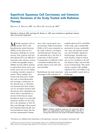November 2015 in “Pediatrics in review” The boy had severe facial swelling and scalp infection after using his mother's shampoo.
September 2015 in “Pediatrics in review” The baby's rash and hair loss were cured with zinc supplements and better skin care.
September 2015 in “Pediatrics in review” The 7-month-old boy has a persistent rash that doesn't improve with typical skin treatments.
 July 2014 in “Hair transplant forum international”
July 2014 in “Hair transplant forum international” The 20th Orlando Live Surgery Workshop was important for the hair restoration field and aimed to influence future surgeons.
 May 2014 in “JAMA Dermatology”
May 2014 in “JAMA Dermatology” Mother and son diagnosed with a rare genetic hair loss condition with no effective treatment.
 April 2014 in “Significance”
April 2014 in “Significance” Unconventional home remedies can sometimes show surprising results.
 January 2014 in “International Journal of Trichology”
January 2014 in “International Journal of Trichology” A man had an unusual type of hair loss that didn't match known patterns and didn't improve with treatment.
October 2013 in “International Journal of Pediatric Endocrinology/International journal of pediatric endocrinology” A boy with early puberty and laughing seizures was treated, stopping seizures and slowing puberty.
 January 2013 in “Psychiatry and clinical neurosciences”
January 2013 in “Psychiatry and clinical neurosciences” Physical symptoms in depression can reveal underlying medical conditions.
 June 2011 in “Oncology times”
June 2011 in “Oncology times” Dr. Mario Lacouture recommends preventive and specific treatments for skin side effects caused by EGFR inhibitors to improve patients' quality of life.
 December 2010 in “Dermatologic Surgery”
December 2010 in “Dermatologic Surgery” The letter discusses a disagreement about the definition of the "frontal area" in hair restoration surgery and questions the effectiveness of treatments like finasteride and minoxidil on this area.
 May 2009 in “South African Family Practice”
May 2009 in “South African Family Practice” The author believes that giving medical conditions official names can sometimes overwhelm or scare patients.
 April 2009 in “Contemporary Psychoanalysis”
April 2009 in “Contemporary Psychoanalysis” Analysts should confront their biases and self-interests to improve therapy.
 March 2009 in “Journal of Biomedical Research”
March 2009 in “Journal of Biomedical Research” Herbal extract mixtures may speed up hair growth and could help treat baldness.
 February 2009 in “Journal of The American Academy of Dermatology”
February 2009 in “Journal of The American Academy of Dermatology” A man with Klinefelter syndrome had a leg ulcer that didn't heal well, even with treatment.
 February 2007 in “Facial Plastic Surgery”
February 2007 in “Facial Plastic Surgery” Dr. Sheldon S. Kabaker acknowledges the progress in hair restoration surgery and the shift towards natural results, stressing the need for patient education and future advancements.
 May 2006 in “Dermatologic Surgery”
May 2006 in “Dermatologic Surgery” Radiation therapy successfully treated an elderly man's skin cancer and pre-cancerous scalp lesions.
 June 2004 in “Dermatologic Surgery”
June 2004 in “Dermatologic Surgery” The single-scar technique in hair transplantation minimizes scarring and preserves hairs for future use, with proper training overcoming its perceived drawbacks.
 June 2004 in “Dermatologic Surgery”
June 2004 in “Dermatologic Surgery” Dr. Walter P. Unger suggests that copying a person's natural hair direction and angle during transplants leads to a more natural and fuller appearance.
 August 2003 in “International Journal of Cosmetic Surgery and Aesthetic Dermatology”
August 2003 in “International Journal of Cosmetic Surgery and Aesthetic Dermatology” The author suggests continuing to use reusable surgical instruments until there's proof of disease transmission, but acknowledges some may prefer disposables for safety despite the low risk.
 June 2001 in “International Journal of Cosmetic Surgery and Aesthetic Dermatology”
June 2001 in “International Journal of Cosmetic Surgery and Aesthetic Dermatology” Dr. Shiell concludes that good communication, proper training, and thorough documentation can help avoid legal issues in cosmetic surgery.
 July 2000 in “Dermatologic Surgery”
July 2000 in “Dermatologic Surgery” Dr. Yarborough denied endorsing Derma Genesis and was mistakenly represented due to his office manager's error; also, over 30% of tested skin products were contaminated with bacteria.
 May 1999 in “Dermatologic Surgery”
May 1999 in “Dermatologic Surgery” The cell culture medium "RPMI" might slightly improve hair graft survival, but not by a significant amount.
 May 1999 in “Dermatologic Surgery”
May 1999 in “Dermatologic Surgery” Dr. Zitelli emphasized that "Mohs surgery" should only be called that when one doctor does both the surgery and pathology.
 December 1998 in “The American Journal of Cosmetic Surgery”
December 1998 in “The American Journal of Cosmetic Surgery” Hair restoration should focus on quality and value, not cost, to maintain the field's reputation and ensure patient satisfaction.
 August 1998 in “Dermatologic Surgery”
August 1998 in “Dermatologic Surgery” Dr. George A. Farber recommends using follicular unit transplantation for hair restoration because it gives a more natural look and has fewer problems compared to the older miniflap technique.
 November 1997 in “Postgraduate Medicine”
November 1997 in “Postgraduate Medicine” Robert T. Leonard Jr. disagrees with Max Rubin's negative views on hair loss treatment, advocating for hormonal tests in women and supporting the use of medications and surgery for androgenetic alopecia.
 September 1997 in “Dermatologic Surgery”
September 1997 in “Dermatologic Surgery” Dr. James E. Vogel is happy to co-edit a special issue on hair restoration, noting the field's diverse approaches and the value of the insights offered despite research challenges.
 June 1997 in “The American Journal of Cosmetic Surgery”
June 1997 in “The American Journal of Cosmetic Surgery” Hair restoration surgeries increased significantly in the early 1990s, with a focus on natural-looking results and various techniques tailored to individual needs.
 January 1996 in “Journal of Dermatological Treatment”
January 1996 in “Journal of Dermatological Treatment” Dermatologists should know about cosmetic science and aesthetics because patients care about skin appearance and health.

























